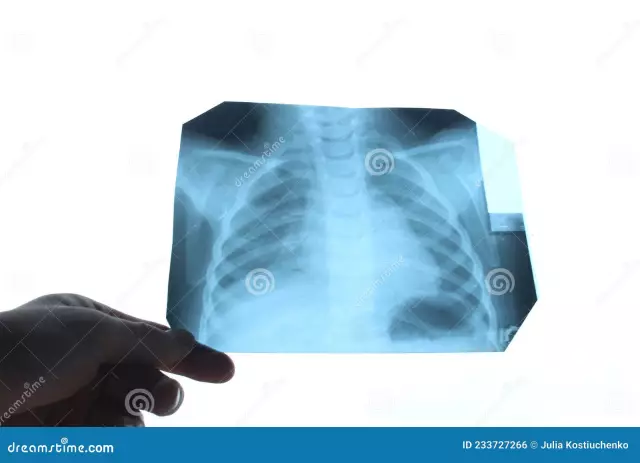- Author Rachel Wainwright wainwright@abchealthonline.com.
- Public 2023-12-15 07:39.
- Last modified 2025-11-02 20:14.
Sarcoidosis
General characteristics of the disease

Sarcoidosis belongs to a group of chronic inflammatory diseases. It most commonly affects the lungs of people between the ages of 30 and 40. Children and elderly people get sick much less often. In Russia, the disease is diagnosed in approximately five people per 100,000 population.
The cause of pulmonary sarcoidosis is not known for certain. The researchers only found that inflammation significantly increases the activity of lymphocytes - white blood cells, which begin to produce substances that cause the formation of granules in various organs. The possibility of transmission of the disease from person to person has also not been proven. In some cases, the treatment of sarcoidosis is necessary not only for the patient, but also for his family members, however, doctors explain this fact by heredity, or unfavorable environmental conditions in the place where people live.
Sarcoidosis - symptoms of the disease
As mentioned above, the lungs are the main organ affected by sarcoidosis. Treatment of the lungs is difficult due to the fact that in 90% of cases the disease proceeds absolutely without any pronounced symptoms. In such situations, sarcoidosis can only be detected by x-ray. The absence of symptoms is explained by the defeat of the intrapulmonary lymph nodes, which in the overwhelming majority of cases can be determined only with the help of special equipment, since there are no external manifestations in patients.
How do you recognize sarcoidosis of the lungs? Symptoms of the disease appear in the later stages and appear as:
- shortness of breath and fatigue;
- dry cough and chest pain;
- hemoptysis;
- pulmonary fibrosis and impairment of the normal functioning of the respiratory system.
In addition, sarcoidosis of the lungs reveals itself as inflammatory changes in the skin, in the lymph nodes and joints. The lack of adequate treatment can lead to complete blindness of a person and irreversible changes in the brain, heart, kidneys and liver.
Diagnosis and treatment of sarcoidosis

The diagnosis of pulmonary sarcoidosis is established only after a complete examination and analysis of the patient's condition. A prerequisite is a biochemical blood test and chest X-ray. To confirm sarcoidosis, the symptoms of which are similar to tuberculosis, the patient may be prescribed a Mantoux test. The reaction should be negative. It is possible that a doctor will need to examine the lungs using specialized medical equipment to make an accurate diagnosis. As a rule, in modern clinics, a bronchoscope is used, which is an elastic tube that is inserted into the lungs and allows you to take fluid for analysis for the presence of cells that cause inflammatory processes.
Lung biopsy is used only in controversial cases. The procedure is short, carried out under local anesthesia and does not cause any pain or other unpleasant sensations to the person.
As for the treatment. In many patients, the disease goes away by itself, but it is better not to take risks and to treat sarcoidosis under the supervision of a doctor, since only he can assess the severity of the damage to internal organs and prescribe adequate restorative procedures.
In some cases, sarcoidosis of the lungs leads to respiratory failure and blindness. Adverse changes are controlled by corticosteroid hormones. They are also used in cases where the human brain and heart are involved in the inflammatory process, as well as for any skin manifestations of the disease.
The condition of the lung tissue and the spread of inflammation are monitored using regular x-rays.
Prevention of the disease
To prevent exacerbations of sarcoidosis, it is necessary to quit smoking, lead a healthy lifestyle, and avoid prolonged contact with chemicals and drugs that affect the liver, lungs, heart and other organs. Sarcoidosis provokes the appearance of stones in the bladder, therefore, during the illness, you should give up calcium-rich foods (cheese, milk) and beach holidays, since the sun's rays contribute to the production of calcium in the human blood.
YouTube video related to the article:
The information is generalized and provided for informational purposes only. At the first sign of illness, see your doctor. Self-medication is hazardous to health!






